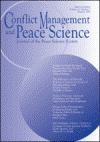Barbieri, Keshk, and Pollins (2009) introduce a new Correlates of War trade data set and express various opinions on issues related to analyzing data on trade and how these may impact our inferences on the relationship between trade and conflict. Since there are 33 references to my name in their paper and the authors believe the expanded trade that I have generated to be highly problematic, I respond to some of the issues raised, clarify the specific sources of disagreement, and outline my thoughts on how trade data can be improved and best used in empirical analyses. Barbieri et al. (2009) could be interpreted as suggesting that inferences on the pacifying effect of trade on conflict are fragile and sensitive to decisions on the data. However, their paper in my view provides few new empirical results and does not change my own interpretation of the evidence that dyadic trade reduces the risk of conflict.
Gleditsch, Kristian Skrede (2010) On Ignoring Missing Data and the Robustness of Trade and Conflict Results: A Reply to Barbieri, Keshk, and Pollins, Conflict Management and Peace Science 27 (2): 153–157.







